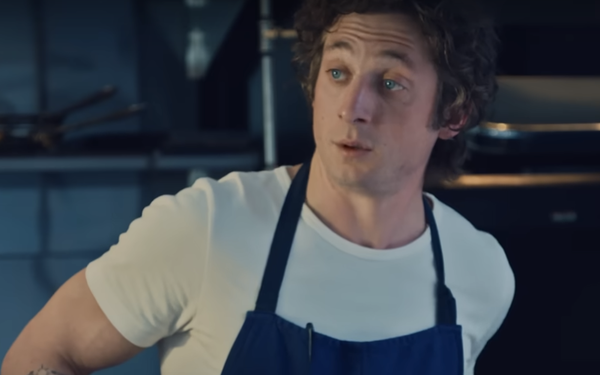
After being flooded
with Emmys and viewer worship after the two previous seasons of “The Bear,” perhaps Christopher Storer, the showrunner, writer, and director, has burnt out. Perhaps he has identified too
closely with his main creation and character, Chef Carmen Berzatto (Jeremy Allen White.)
Because most of the third season of what had been my favorite TV series is sad, anxious, lackluster and
stuck, just like Carmy.
Season two ended with the rising chef, on an opening night, accidentally locking himself inside the walk-in freezer of his new, gleaming, haute cuisine,
Michelin-star-aspiring restaurant, The Bear.
That was a bit of inspired psychologically aware writing, given that Freud has said, “There are no accidents.”
But season two
was forward-moving, sometimes at a frantic pace, as Carmy built and inspired his team for the The Bear, a world away from The Original Beef, the greasy spoon beef sandwich shop he inherited from
his brother, after Mikey suddenly committed suicide.
advertisement
advertisement
And the grief and anxiety that Carmy continues to carry about his mentally disturbed family has an iron grip on him.
In season
three, he’s out of the freezer, but still locked into his own self-punishing, ruminating, perfectionistic, backward-looking box.
No matter how artistically presented season three is, the
screaming fights Carmy has in the kitchen with his cousin Richie (Ebon Moss-Bachrach), and the way he ignores his would-be partner and chef de cuisine, Sydney (Ayo Edebiri) are not fun to
watch.
But there are two huge exceptions: Episode six, called “Napkins,” was brilliantly written by Catherine Schetina and movingly directed by Edebiri.
It’s a
polished gem where we get the backstory of Tina, the line cook (Liza Colón-Zayas), who works her way up to being Sydney’s sous chef. It goes back perhaps a decade, to a
time when Tina was laid off from her job after 15 years of working in an office, and was desperately trying, without success, to find a new job.
Upset and depressed, she happens to wander into
Original Beef, Carmy’s brother’s joint, while Mikey (Jon Bernthal) was still alive. It’s a happy, sloppy, place, in great contrast to The Bear, where several of the same employees
now work
Tina orders a coffee, and Richie, the cousin Carmy now screams at, gives her that and a free sandwich.
Teary-eyed, she takes a bite. Mikey comes over to talk to her. She tells
him her no-luck story, and he ends up offering her a job.
It’s like a stand-alone play, gentle and telling, as opposed to the close-ups and frenetic cuts crashing around most of the
other episodes.
Another great exception is the episode called “Ice Chips,” also written by a woman, Joanna Calo (co-showrunner and executive producer), and directed by Storer. It
brings back the Berzatto clan’s mom, Donna, played by the Emmy-worthy, if scenery-chewing, Jamie Lee Curtis, as the mother of all dysfunction in the family, as shown in last season’s
masterpiece episode, “Fishes.” That ep focused on a frenzied Berzatto family Christmas dinner, in which Donna ended up driving her car into the house.
That chaos explained why the
remaining children, Carmy and his sister, Sugar (Abby Elliott), who was brought into The Bear as a project manager, stopped speaking to Donna.
Long-pregnant Sugar goes into labor, and after
not being able to reach any of her family, ends up calling her mother to take her to the hospital. As typical of character like Donna, she spends the first minutes neglecting her daughter and making
it about herself, trying to entertain the nurse. But as the labor slowly progresses, Donna ends up delivering not only on ice chips, but being a nurturant figure, perhaps for the first time
ever.
Aside from these two episodes, however, much of season three feels like a place holder for season four. And when it’s not, it’s obnoxious about inserting a roster of
high-flying real-life chefs into the drama.
Watching these renowned master chefs teach in the kitchen in flashbacks with a younger Carmy is interesting, and we get to see how to debone and
truss a chicken.
But featuring these people hanging together in the last episode, at a “funeral” for the restaurant Ever, comes across as too reverent, pretentious and show-offy. I
can’t figure out why Storer was inclined to give over the series this way. Publicity? Trying to get more American Express-type advertisers? Becoming part of this inside, elevated
culture?
Of course, the show’s inside view of high-foodieland has gotten a grip on pop culture, including the language (“Yes, Chef!” “Doors!”
“Corners!” ) and the makings of elaborate, beautifully plated meals.
On the downside, however, I got tired of seeing Carmy hunched over his perfectly miniaturized servings,
operating surgically to place a garnish with a tweezer. And because a lot of the season revisited his time serving under another abusive chef, (played by Joel McHale), Carmy’s transferred that
style of aggression to his own kitchen. It bothered me to see him throwing a $200 piece of Wagyu beef into the garbage because it’s not perfect enough.
For that matter, these
restaurants, where a tasting menu can cost anywhere from $150 to $400 a person without wine, are for the two percent. Most people can’t afford to go to one, ever.
So I started thinking
about season four. If Carmy learns to get out of his locked-in self, what might he end up doing?
I like the story of Eleven Madison Park, that now-vegan dreamland, and how it transformed
itself during COVID, becoming a commissary kitchen that produced almost 3,000 meals a day to feed hungry New Yorkers.
Because The Bear’s viewership was there for the humanity and back
stories, not just to be voyeurs in such an extremely upscale kitchen.